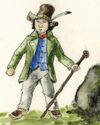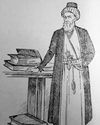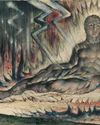Prøve GULL - Gratis
The Lottery' & Locke's Politics
Philosophy Now
|April/May 2022
John P. Irish considers through an infamous lottery.

On June 26 1948 Shirley Jackson (1916-65) published what may be the most infamous short story in American literature. Called ‘The Lottery’, it was featured in The New Yorker, and at the time became one of the most controversial pieces ever printed, resulting in the magazine receiving more hate mail and subscription non-renewals than anything else up to that point in its history. Even Jackson’s mother shared her dislike for the story with her daughter, claiming that the younger generation was too obsessed with violence.
The story is about a fictional small town in America which conducts an annual ritual known as ‘the lottery’, whose purpose is to choose a human sacrifice to be stoned to death to ensure the community’s well-being and continued prosperity. I have used the story many times in my American Studies classes – I typically use it as a way of introducing post-WWII American society – but it only recently struck me that this story can also be used to teach certain aspects of Locke’s social contract theory, as found in his Two Treatises of Government.
John Locke (1632-1704) was an English philosopher and physician, and is considered to be one of the most influential thinkers of the Enlightenment. In fact, in 1689 he published two classic works which have each had a profound effect on the history of philosophy: An Essay Concerning Human Understanding, which outlined his empiricist philosophy, and Two Treatises of Government, which outlined his political theory. The
Denne historien er fra April/May 2022-utgaven av Philosophy Now.
Abonner på Magzter GOLD for å få tilgang til tusenvis av kuraterte premiumhistorier og over 9000 magasiner og aviser.
Allerede abonnent? Logg på
FLERE HISTORIER FRA Philosophy Now

Philosophy Now
Bilbo Theorizes About Wellbeing
Eric Comerford overhears Bilbo and Gandalf discussing happiness.
9 mins
December 2025 / January 2026

Philosophy Now
What Women?
Marcia Yudkin remembers almost choking at Cornell
11 mins
December 2025 / January 2026

Philosophy Now
Islamic Philosophers On Tyranny
Amir Ali Maleki looks at tyranny from an Islamic perspective.
4 mins
December 2025 / January 2026

Philosophy Now
Peter Singer
The controversial Australian philosopher defends the right to choose to die on utilitarian grounds
5 mins
December 2025 / January 2026

Philosophy Now
Another Conversation with Martin Heidegger?
Raymond Tallis talks about communication problems.
7 mins
December 2025 / January 2026

Philosophy Now
Letters
When inspiration strikes, don't bottle it up. Email me at rick.lewis@philosophynow.org Keep them short and keep them coming!
17 mins
December 2025 / January 2026

Philosophy Now
The Philosophy of William Blake
Mark Vernon looks at the imaginative thinking of an imaginative artist.
9 mins
December 2025 / January 2026

Philosophy Now
Philosophical Haiku
Peering through life’s lens God in nature is deduced: The joy of being.
1 mins
December 2025 / January 2026

Philosophy Now
Philosophy Shorts
More songs about Buildings and Food' was the title of a 1978 album by the rock band Talking Heads. It was about all the things rock stars normally don't sing about. Pop songs are usually about variations on the theme of love; tracks like Rose Royce's 1976 hit 'Car Wash' are the exception. Philosophers, likewise, tend to have a narrow focus on epistemology, metaphysics and trifles like the meaning of life. But occasionally great minds stray from their turf and write about other matters, for example buildings (Martin Heidegger), food (Hobbes), tomato juice (Robert Nozick), and the weather (Lucretius and Aristotle). This series of Shorts is about these unfamiliar themes; about the things philosophers also write about.
2 mins
December 2025 / January 2026

Philosophy Now
Hedonic Treadmills in the Vale of Tears
Michael Gracey looks at how philosophers have pursued happiness.
8 mins
December 2025 / January 2026
Translate
Change font size
